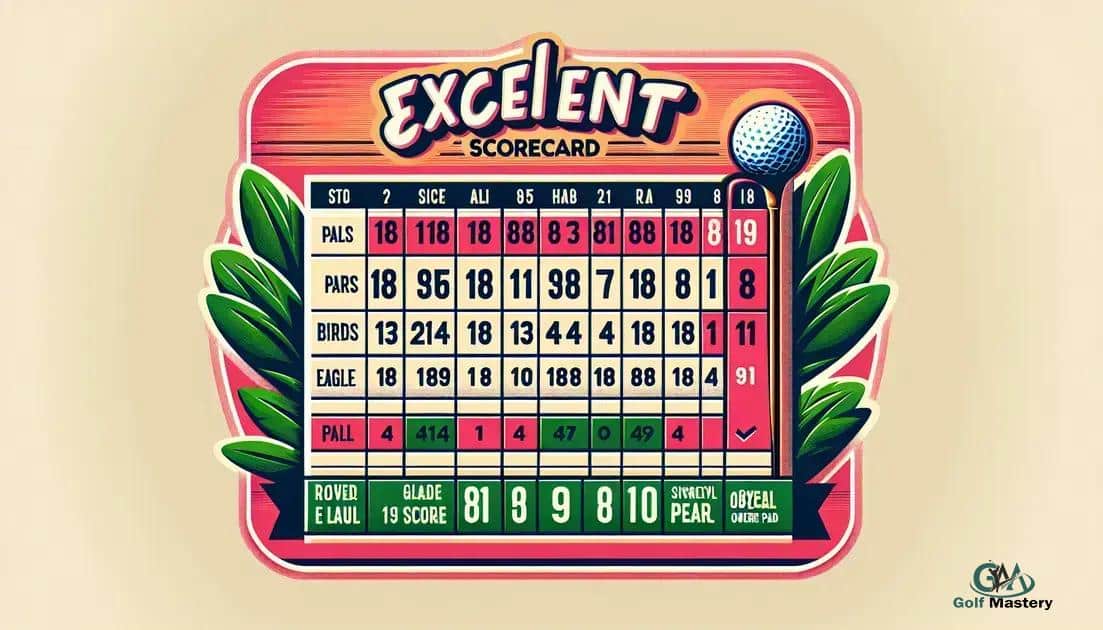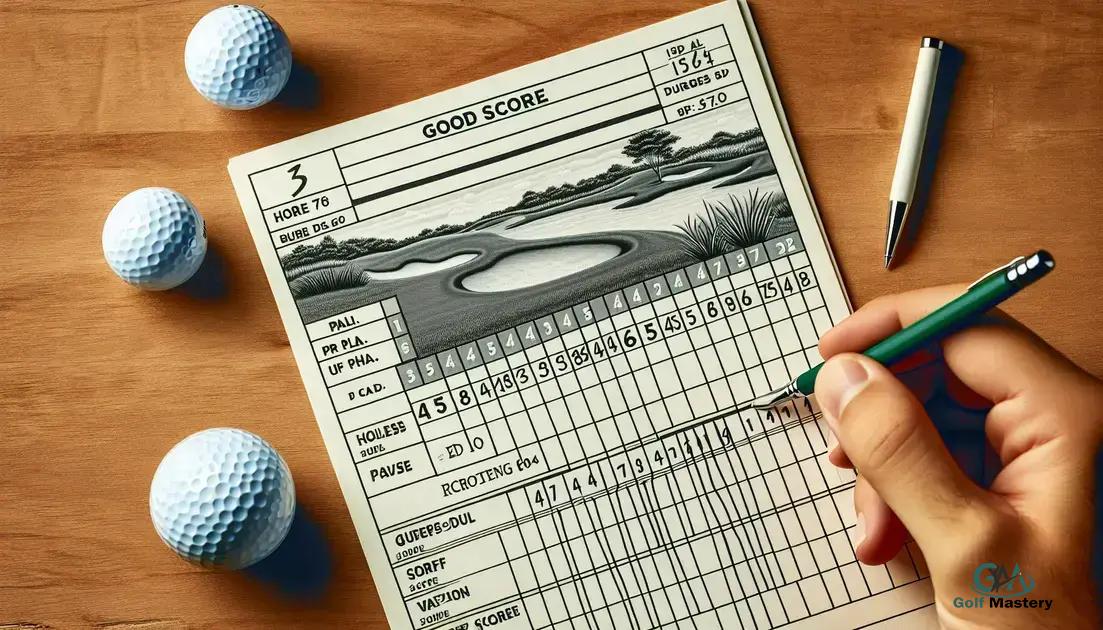What is a good golf score? Learn the essentials of scoring in golf and improve your game today!
A good golf score varies by skill level but generally, a score below par is considered good. For beginners, aiming for around 100 is ideal, while advanced players strive for 80 or lower. Consistent practice, focusing on short game skills, and effective course management are key to improvement.
Golf is a game of precision, patience, and strategy. Many aspiring players often wonder, what is a good golf score? This question is crucial for any golfer looking to improve their skills. In this article, we will clarify golf scoring and what defines a good score, along with practical tips to enhance your game. Whether you are a beginner or a seasoned golfer, understanding how to assess your performance is key to enjoying and excelling in golf.
Understanding Golf Scoring Basics
Golf scoring can be a bit confusing for newcomers. The objective of golf is to complete the course in the fewest strokes possible. Each hole has a designated par score, which is the number of strokes an expert golfer is expected to take to finish that hole. Understanding these essentials can significantly enhance your golfing experience.
What is Par?
Par refers to the standard number of strokes set for a hole or course. For instance, a par 3 hole means that a skilled golfer should take 3 strokes to reach the hole. There are different types of holes:
- Par 3: Usually shorter, ideal for tee shots.
- Par 4: Requires a solid drive followed by an approach shot.
- Par 5: Longer holes meant for three strokes to reach the green.
Scoring Terms
Understanding scoring terms is essential for interpreting your results:
- Birdie: One stroke under par.
- Eagle: Two strokes under par.
- Bogey: One stroke over par.
- Double Bogey: Two strokes over par.
Stroke Play vs. Match Play
There are two main types of golfing formats, stroke play and match play. In stroke play, the total number of strokes taken across the round is counted. In match play, golfers compete hole by hole, with the lowest score on each hole winning that hole.
Keeping Score
To keep score, you record the number of strokes taken at each hole. Add these to determine your total score at the end of the round. It is beneficial to check your scores against the par for each hole to see how you performed relative to the expected standard.
As you learn the ins and outs of golf scoring, you will gain more confidence on the course. The next step is to explore how to calculate your score accurately.
How to Calculate Your Golf Score
Calculating your golf score is essential for tracking your progress and improving your game. Follow these simple steps to understand how to calculate your golf score effectively.
Step 1: Record Your Strokes
Every time you hit the ball, you should count it as a stroke. Make sure to record every stroke you take, including penalty strokes, as these will affect your final score.
Step 2: Know the Par for Each Hole
Each hole on the course has a designated par. Before you start, check the scorecard to see what the par is for each hole. This will help you compare your performance to the expected standard for good golf.
Step 3: Add Your Total Strokes
After you finish your round, add up all the strokes you took on each hole. This total gives you your gross score. For example, if you took 5 strokes on a par 4, that contributes a score of 5 to your total.
Step 4: Calculate Net Score (if applicable)
If you’re competing in a format using handicaps, subtract your handicap from your gross score to find your net score. For example, if your gross score is 90 and your handicap is 10, then your net score is 80.
Step 5: Compare Your Score to Par
Finally, compare your total score to the total par of the course. If your score is lower than par, you played well. If it’s higher, you know you have areas to improve upon.
Calculating your score accurately can help you gauge your progress over time and set goals for improvement. Let’s delve into what constitutes a good golf score next.
What Constitutes a Good Golf Score?
When evaluating your game, you may wonder, what constitutes a good golf score? Understanding this can help you set realistic goals and improve your skills.
General Guidelines
A good golf score varies based on skill level and the course layout. Generally, a score below par is considered good. For instance, if the par for your course is 72, any score below that indicates you played well.
Beginners vs. Experienced Golfers
For beginners, scoring around 100 is often seen as a decent target. As you gain experience, aim to reach 90 or lower. For more advanced players, a score of 80 or less is necessary to be competitive.
Course Rating
Different courses have different ratings, which can impact what is considered a good score. A tougher course might have a higher par, making a good score relative to the challenges it presents.
Comparing Yourself to Your Peers
Comparing your score to others of similar skill can give you insight into where you stand. If most golfers in your group average around 90 strokes, and you regularly score in the 80s, you’re performing well.
Personal Improvement
Ultimately, what matters is your progress over time. If you are consistently scoring lower than you did last year, you are improving. Strive for personal bests while keeping realistic expectations based on your skill level.
By understanding these factors, you can gauge your performance and identify areas for improvement. Let’s explore the factors that can influence your golf scores.
Factors That Influence Golf Scores
Several key factors can influence your golf scores and overall performance on the course. Understanding these can help you identify areas for improvement.
Course Difficulty
The difficulty of the golf course you are playing can greatly affect your score. Courses with many hazards, narrow fairways, and tricky greens often result in higher scores. Be aware of the course rating and slope rating which help you understand the challenge a course presents.
Weather Conditions
Weather can play a significant role in golf. Wind and rain can make shots more challenging, while sunny and calm conditions can lead to better scores. Always check the forecast and prepare accordingly.
Your Equipment
The clubs and balls you use can impact your performance. Ensure that your equipment is suited to your playing style. For example, using the right shaft flex can make a difference in how well you can control your shots.
Physical and Mental Health
Your physical fitness and mental state also influence your game. Being physically fit can lead to better endurance and concentration on the course. Additionally, mental distractions can hinder your focus, so practicing mindfulness techniques can improve your overall performance.
Practice and Experience
Regular practice builds consistency. The more you play, the better you will understand your strengths and weaknesses. Consider setting aside time for specific skills such as putting or driving to improve your scores.
By being aware of these factors, you can take steps to minimize their impact and ideally lower your golf scores. Now, let’s explore some effective tips to help you improve your game.
Tips for Improving Your Golf Score
If you want to improve your golf score, there are several practical tips you can follow. These recommendations can enhance your skills and overall performance on the course.
Practice Regularly
Consistent practice is key to improvement. Spend time on the driving range working on different shots. Dedicate days to focus specifically on putting, chipping, and full swings.
Set Realistic Goals
While it’s great to aim for a lower score, set achievable goals. For instance, if you currently average 100, try working toward 95 before aiming for 90. Small, realistic goals lead to long-term success.
Work on Your Short Game
Improving your short game can have a big impact on your scores. Spend at least half your practice time mastering your putting and chipping skills. Often, most strokes are lost on the green.
Learn Course Management
Understanding how to play each hole can save strokes. Know when to play safely and when to be aggressive. For example, if a hole has water hazards, assess the risks before deciding where to hit your ball.
Get Professional Lessons
Consider taking lessons from a golf professional. They can identify weaknesses in your technique and help you develop a stronger game. A few lessons can provide valuable feedback and personalized strategies for improvement.
By incorporating these tips into your practice routine, you’ll likely see improvements in your golf scores over time. Remember to stay patient and persistent as you work on your game.
In Summary: Understanding Good Golf Scores
As we’ve explored, defining what is a good golf score involves understanding various aspects, from the fundamentals of golf scoring to the factors that influence your performance. Whether you are a beginner or an experienced player, knowing your averages and setting realistic goals can lead to significant improvements.
It is essential to practice regularly and work on both your short game and full swings, as these can make a big difference in your scores. By managing your course strategy and possibly seeking professional guidance, you can further enhance your abilities.
Remember, the journey to improving your golf score is a process. Stay patient, passionate, and enjoy the game as you strive to reach new heights on the course.
FAQ – Frequently Asked Questions About Golf Scores
What is considered a good golf score for beginners?
For beginners, a score around 100 is often seen as a decent target. As you improve, aim for lower scores.
How can I calculate my golf score accurately?
To calculate your score, record the number of strokes taken on each hole and add them together, then compare your total to the course’s par.
What factors can influence my golf score?
Factors like course difficulty, weather conditions, your physical and mental health, and practice level can all influence your golf scores.
What are the best tips for improving my golf score?
Regular practice, working on your short game, setting realistic goals, and learning course management are key tips for improving your golf score.
How important is the short game in golf?
The short game is crucial as a significant number of strokes are lost around the greens. Improving your putting and chipping can lower your scores.
Should I take golf lessons to improve?
Yes, professional lessons can provide personalized feedback and strategies that can enhance your overall game and technique.






Leave a Reply